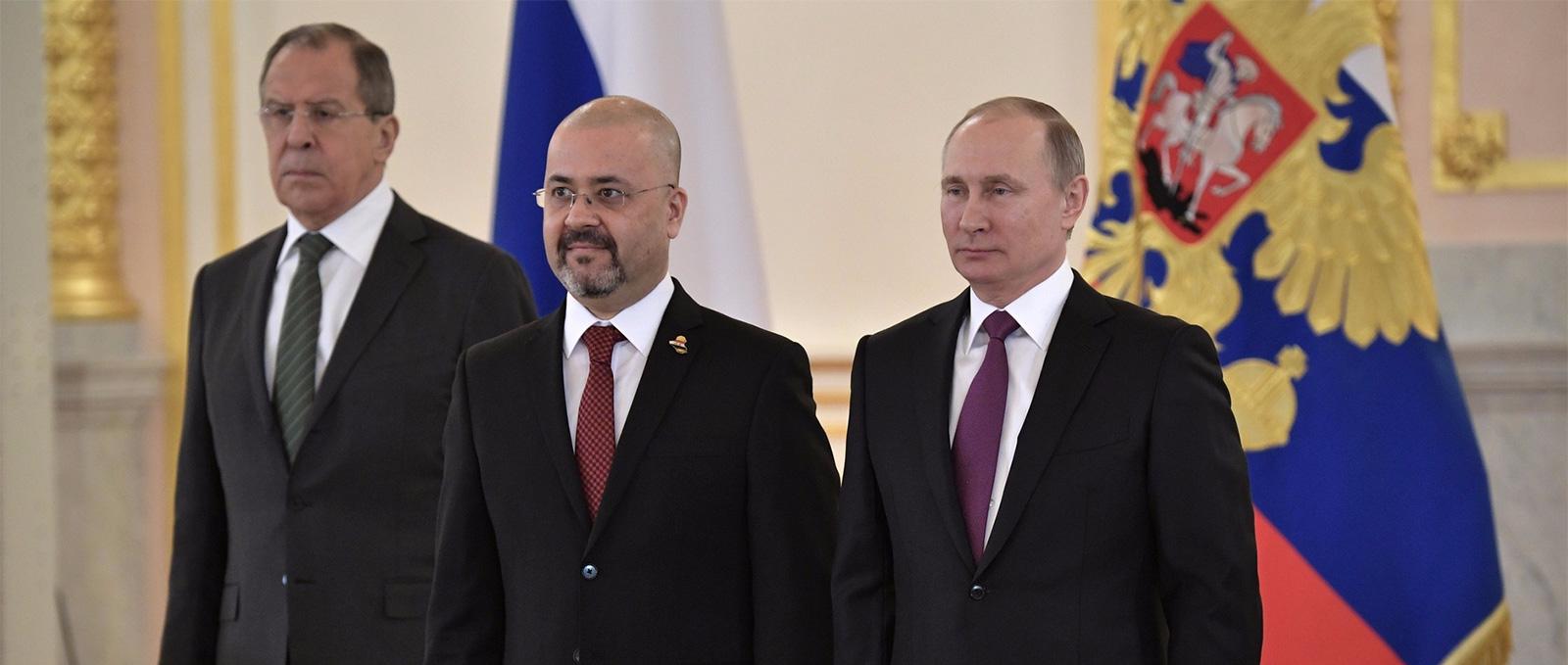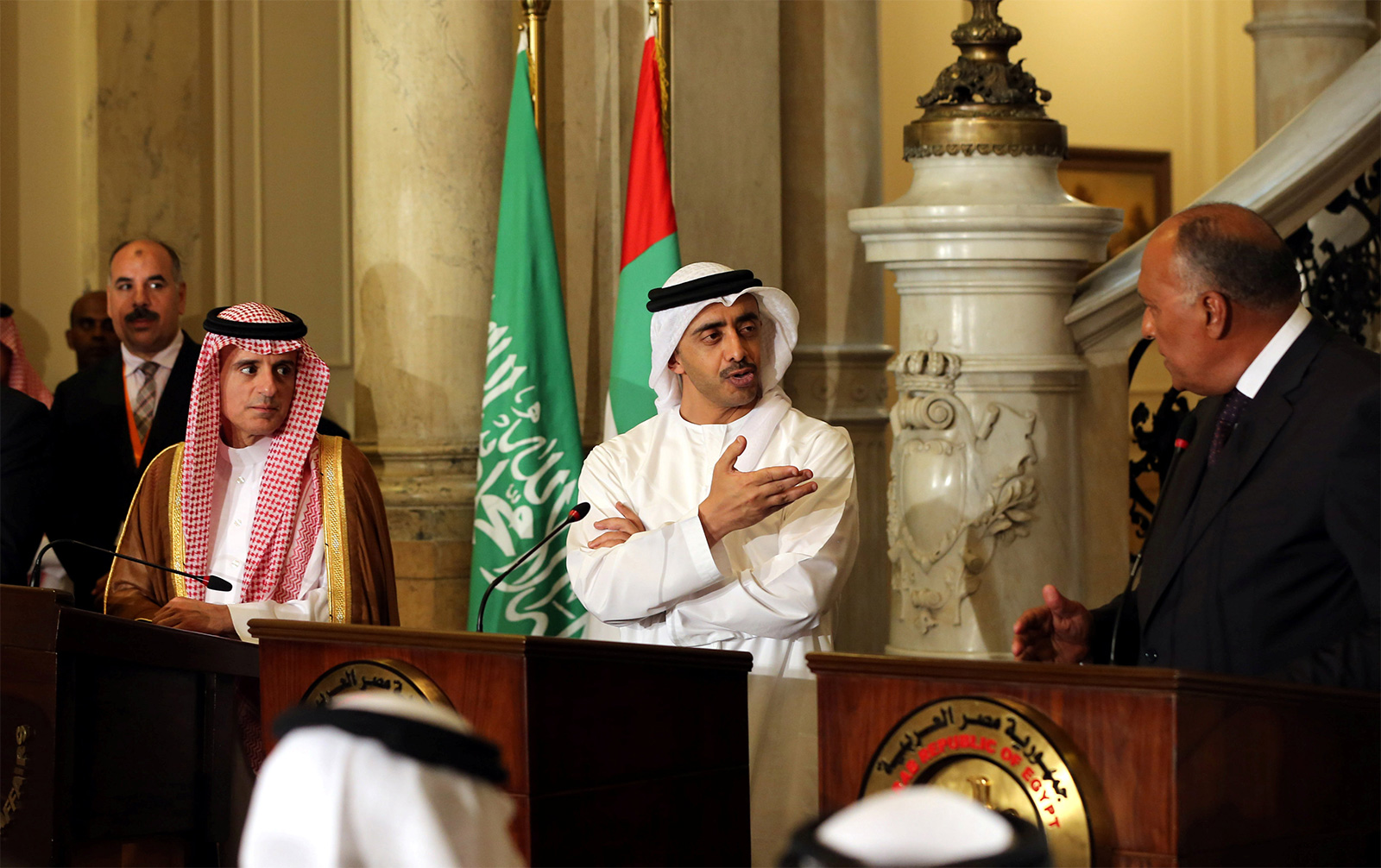Muqtada al-Sadr is one of the few Iraqi politicians capable of bringing hundreds of thousands of people to the streets of Baghdad. His actions are remarkable given what is happening against the backdrop of preparations being made by the Iraqi people for the elections and the ISIS’s loss of the most populated cities. The terrorists have no choice but to carry out terrorist attacks and hide out in the desert regions. The Popular Mobilization Forces (PMF), Al-Hashd al-Shaabi set up as an umbrella organization in 2014 plays a special role in this context; IS fighters have no interest in being captured by the group.
A far more significant group within the PMF is the Saraya al Salam (“the Peace Brigades”), the successor to Muqtada al-Sadr’s famous Mahdi Army, a Shiite organization that fought against the occupation forces in 2003–2004.
Muqtada al-Sadr espouses anti-American rhetoric, which is why many were surprised when in August 2017 he visited Saudi Arabia, an ally of the United States. There is an opinion that Saudi Arabia and its allies are planning to win Iraq over and thus counteract the influence of their rival Iran. The Shiite leader is seeking to make Iraq part of the Arab world – the so-called Arab family – once again.
These changes in the region can be assessed differently. For some, strengthening relations between Saudi Arabia and Iraq represents a desire on the part of the Saudis to resist the influence of Iran in the region. Others see it as a permission deliberately given by Iran to create a platform for cooperation between Iraq and Saudi Arabia.
One thing will remain unchanged: with his military might, as well as the influence he wields over the masses and the significant representation he enjoys in the state structures, Muqtada al-Sadr is likely to remain an influential politician in Iraq for years to come.
Muqtada al-Sadr is a descendent of the religious Sadr dynasty, a prominent family of Shiite intellectuals. He is one of a small number of politicians who possess significant influence in modern Iraq and who are capable of inspiring hundreds of thousands of people to take to the streets. In the past Al-Sadr’s was a leader of the Jaysh al-Mahdi extremist group and one of the primary enemies of the United States. Today he is affiliated with the Al-Ahrar Bloc, which currently has 34 seats in the 328-seat Council of Representatives of Iraq. He is currently developing contacts with regional leaders and is even preparing a tour to Europe. Al-Sadr’s actions are remarkable given what is happening against the backdrop of preparations being made by the Iraqi people for the elections and ISIS’s loss of control over the largest cities, including Mosul, Tal Afar and Hawija. The terrorists have no choice but to carry out terrorist attacks and hide out in the desert regions. The Popular Mobilization Forces (PMF) set up as an umbrella organization in 2014 plays a special role in this context; IS fighters have no interest in being captured by the group.
Freedom Fighters of Iraq, Unite!
The PMF was set up as an umbrella organization in 2014 to fight IS after Al-Sayyid Ali al-Husseini al-Sistani issued a fatwa for a jihad kifaiiy. It brought together existing but isolated military and political organizations, and later brigades consisting of Sunnis, Christians and Yazidis. The PMF is generally regarded as a pro-Iranian structure. Nevertheless, it enjoys broad support from the Iraqi population. PMF forces consist of over 100,000 people and are thus approaching the Iraqi Army in terms of its size (the Iraqi army has 200,000 men). When it comes to fighting spirit, however, PMF fighters are often way ahead of their counterparts in the Iraqi Army. In 2016, the Organization was granted the status of an official branch of the armed forces and thus received financing from the Iraqi government. However as for individual groupings within the PMF, the Saraya al-Salam militia is the most influential. The Saraya al-Salam can be considered the successor to Muqtada al-Sadr’s well-known Mahdi Army, a Shiite organization that fought against the occupation forces in 2003–2004. Back then, the U.S.–Sadr conflict was resolved thanks to the authority wielded by Ali al-Sistani. Today notwithstanding, tens of thousands of people have once again taken up the fight in the ranks of the Saraya al-Salam loyal to M. al-Sadr. But it is a completely different fight now – it is a war against IS – and al-Sadr has become a “game changer” in the events, an influential Iraqi politician.
A Window to the Arab World
For the long time, M. al-Sadr was considered to be a “Shiite fundamentalist” thanks to the American media. To be sure, al-Sadr does espouse anti-American rhetoric – as recently as 2016, he said it would be reasonable to launch attacks on U.S. soldiers in response to the increased contingent of troops in Iraq. This is why many were surprised when in August 2017 he visited Saudi Arabia, an ally of the United States. During his visit, he met with Crown Prince Mohammad bin Salman, the man largely responsible for determining the country’s foreign and home policy today. The Saudis are going to take part in the restoration of the (predominantly Sunni) regions affected by Islamic State.
Riyadh has also agreed to launch checkpoint operations on the border with Iraq, increase the number of pilgrims to Mecca and open a consulate in the Iraqi city of Najaf. Muqtada al-Sadr also lives in Najaf, the same city where armed hostilities took place with the participation of American troops in 2003–2004 and during which al-Sadr’s Mahdi Army troops rallied against the occupation forces following the overthrow of Saddam Hussein. Thus, steps have been taken to intensify contacts between the southern regions of Iraq and Saudi Arabia. Despite the fact that many problems remain (corruption is a prime example), such actions affect trade relations between the two states, help to build trust and reduce the importance of confessional differences, all of which contribute to the search for a platform for mutually beneficial cooperation. However, creating the necessary level of trust between the two countries does not reveal the essence of the Saudis’ interest in Iraq.
Many have said that Saudi Arabia and its allies are planning to win Iraq over to their side and thus counteract the influence of their rival Iran. After his visit to Riyadh, al-Sadr briefly returned to Iraq before setting off for the United Arab Emirates. His actions elicited a public reaction, and not only in Iraq. In essence, the Shiite leader is seeking to make Iraq part of the Arab (and predominantly Sunni) world – the so-called Arab family – once again. However, al-Sadr’s trip also had a negative impact: in Iraq, al-Sadr was reminded that he had visited the country in which the prominent Shiite scholar Nimr al-Nimr had been beheaded. Some of his supporters started calling him Muqtada al-Saudi. Despite this, Muqtada al-Sadr’s positions remain quite strong, and his image as a “Shiite fundamentalist” is shifting more and more towards an “Iraqi nationalist.”
The tendency towards cross-ethnic and interfaith sentiments within the Sadrist Movement started earlier. Since 2014 Al-Sadr has been calling for a crackdown on the corruption that has overwhelmed the country for years and the formation of a government of technocrats that is independent of the exiting political elites. Al-Sadr’s idea was supported by the Prime Minister Haider al-Abadi. Nevertheless, they failed to fully implement their plans, despite the rallies organized by al-Sadr’s supporters in the so-called “Green Zone” of Baghdad (the safest in the city) and their incursion into the Iraqi parliament building. The failure to create a government of technocrats was largely due to resistance from the elites, who had no interest in parting with the privileges to which they believed they were entitled, or in distributing ministerial quotas on the ethno-confessional basis (the “muhasasa” system). But this did not deter al-Sadr. He proposed dissolve the PMF and integrate its groups into the Iraqi Army. He also urged President of Syria Bashar al-Assad to resign for the good of his country’s future, which also confounded the society.
These changes in the region can be assessed differently. For some, strengthening relations between Saudi Arabia and Iraq represents a desire of Saudi Arabia to resist the influence of Iran in the region. Others see it as a permission deliberately given by Iran to create a platform for cooperation between Iraq and Saudi Arabia. In the latter case, Iran is indirectly working with Saudi Arabia. It is in the interest of Iran to ensure that Iraq has access to resources in Saudi Arabia and that the confessional factor now plays a less significant role at the official level and in the media. Iraqi politicians are benefitting from another “effect” of these changes, playing the mediating role in the relations between Riyadh and Tehran. The current situation raises the status of a number of politicians, although it could very well lead to awkward situations. In this context, Muqtada al-Sadr has adopted a position that is equidistant from those of Saudi Arabia and Iran. However, everyone understands that al-Sadr’s visit to Saudi Arabia does not mean he refuses to support influential forces in Iran. Despite the difficult relations with Iran, al-Sadr will maintain contacts with the country and continue to play Riyadh and Tehran off against each other.
Elections, Elections…
Who is behind the changing image of a group that was once one of the main enemies of the United States’ occupation of Iraq? The person responsible for preparing the Sadrists for the “post-Islamic State” elections scheduled in Iraq for April 2018 is Muqtada al-Sadr’s 31-year-old nephew, Ahmed al-Sadr. Unlike many members of the Sadr family, Ahmed received a secular education and has a master’s degree in political science from Beirut University. He is considered a key figure in the formation of the Sadrist’s political agenda and new alliances for the movement’s parliamentary representation, the Al-Ahrar Bloc. Ahmed al-Sadr holds meetings with influential Iraqi politicians, people with different views and faiths. His action have led to a “blurring” of the National Iraqi Alliance — the body that gave the Shiites a majority in the county’s decision-making process.
The Sadrist Al-Ahrar Bloc distanced itself from a coalition with the State of Law Coalition headed by the influential former Prime Minister Nouri al-Maliki and moved towards rapprochement with the National Coalition (Al-Wataniya) led by Ayad Allawi, positioning itself as a secular power. These changes alter the political landscape in Iraq. What is more, the leader of the “pan-Shiite” National Iraqi Alliance, Ammar al-Hakim, severed his ties with the Islamic Supreme Council of Iraq and formed a new group — the National Wisdom Movement. It is believed that the National Wisdom Movement was created in conjunction with Iran, which has decided to give Shiite politicians the opportunity to follow a nationalist (but not a religious) agenda in light of the waning interest among the Iraqi people in religion. What is more, it is possible that a schism is forming within the State of Law Coalition, splitting the party into two camps: those who support Nouri al-Maliki and those who have thrown in their lot with Haider al-Abadi. It is possible that that al-Abadi could join forces with Sadr and Allawi, which would give him an electoral majority over al-Maliki. One thing will remain unchanged in the run-up to the provincial and federal elections: with his military might, as well as the influence he wields over the masses and the significant representation he enjoys in the state structures, Muqtada al-Sadr is likely to remain an influential politician in Iraq for years to come.







